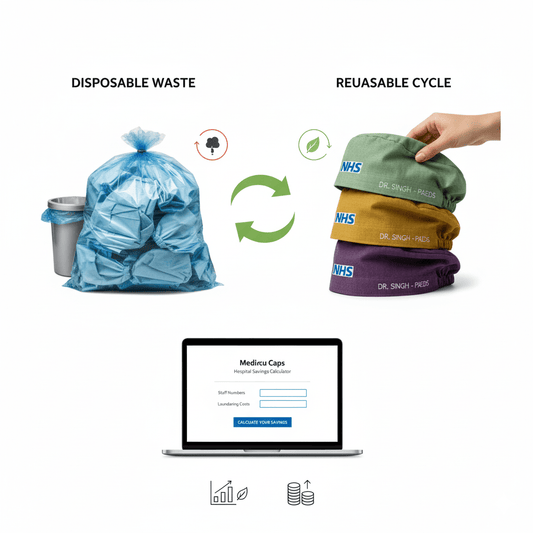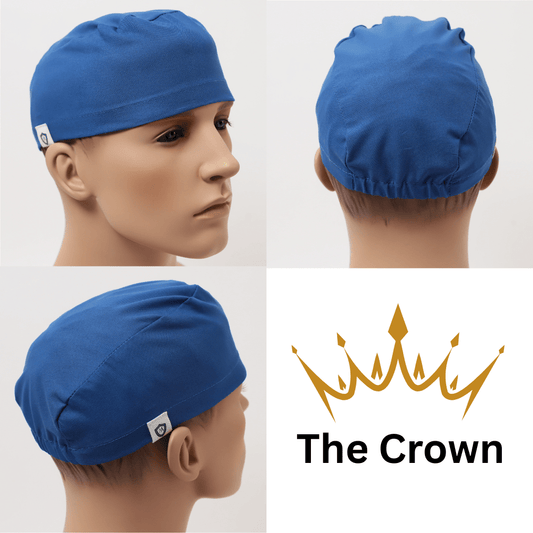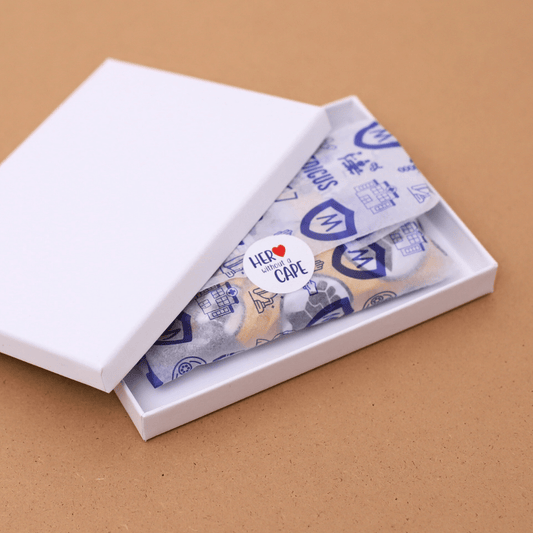
CO₂e Impact of Disposable SMS Polypropylene Scrub Caps (Made in China)
Disposable scrub caps made from SMS (Spunbond-Meltblown-Spunbond) polypropylene have a carbon footprint across each stage of their life cycle. This article provides a breakdown of the cradle-to-grave CO₂-equivalent (CO₂e) emissions, covering production, shipping, and end-of-life disposal. We then combine these to explore four scenarios: (1) sea freight + landfill, (2) sea freight + incineration, (3) air freight + landfill, and (4) air freight + incineration.
1. Production Emissions (China Manufacturing)
Raw Material (Polypropylene SMS Fabric): Producing polypropylene (PP) resin is carbon-intensive. Typical estimates indicate 1.5–2.0 kg CO₂e emitted per kg of PP, with some studies ranging up to ~3.5 kg/kg depending on process efficiency. A representative value is about 1.9 kg CO₂e per kg. Given that each disposable scrub cap might weigh around 5–10 grams, the raw material production can contribute roughly 10–20 g CO₂e per cap.
Manufacturing Energy (Coal-Heavy Grid): Converting resin into SMS fabric and assembling the cap requires heat and electricity, often from coal-based power in China. China’s electricity emissions can average around 537 g CO₂/kWh. Fabric production and final assembly may add another 5–10 g CO₂e per cap, depending on energy intensity. In total, production stage (raw materials + manufacturing) commonly falls around 10–30 g CO₂e per cap.
2. Shipping Emissions (China to Major Market)
Sea Freight (Container Ship): Ocean shipping is more efficient than air freight. Cargo ships emit roughly 10–40 g CO₂ per tonne-kilometer. Over ~10,000 km (e.g., China to the US/EU), shipping a few grams per cap amounts to just 1–2 g CO₂e per scrub cap. In other words, it is negligible compared to production emissions.
Air Freight (Cargo Plane): By contrast, air cargo emits about 500 g CO₂ per tonne-kilometer, ~20–30 times higher than sea freight. Transporting a 5 g cap ~10,000 km by air can add around 20–30 g CO₂e per cap. Hence, air shipping can match or exceed the production footprint for each cap.
3. End-of-Life Emissions (Disposal)
Incineration (Waste-to-Energy): When polypropylene incinerates, nearly all its carbon is released as CO₂. Burning 1 kg of PP yields ~2.7–3.0 kg of CO₂. A 5–10 g cap thus yields about 13–30 g CO₂ purely from incineration. This is a significant addition to the total carbon footprint, often accounting for up to 40% of a disposable PPE item’s lifecycle emissions if incinerated.
Landfill: In a landfill, polypropylene degrades extremely slowly and thus releases minimal GHG in the short term. Studies show negligible immediate CO₂ or CH₄ from landfilled PP, so from a climate perspective, landfilling plastic waste adds very little CO₂e at the disposal stage. However, it does create long-term plastic pollution and other environmental considerations.
4. Overall CO₂e per Cap – Four Scenarios
Combining production, shipping, and disposal, we can estimate total CO₂e per scrub cap under four scenarios:
-
Sea Freight + Landfill – Lowest-emission scenario.
Production (~15 g CO₂e) + sea shipping (~1–2 g) + landfill (~0 g). ≈ 15–18 g CO₂e per cap. -
Sea Freight + Incineration
Production (~15 g) + sea shipping (~1–2 g) + incineration (~10–15 g). ≈ 25–30 g CO₂e per cap. (In practice, often mid-20s g. An EU study found ~17 g CO₂e for a disposable PP cap https://www.ncbi.nlm.nih.gov/pmc/articles/PMC8423212/ , implying incineration and sea shipping. A heavier cap or full combustion could push the total higher.) -
Air Freight + Landfill
Production (~15 g) + air shipping (~20–30 g) + landfill (~0 g). ≈ 35–45 g CO₂e per cap. Shipping dominates, roughly doubling the footprint compared to sea freight. -
Air Freight + Incineration – Highest-emission scenario.
Production (~15 g) + air shipping (~20–30 g) + incineration (~10–15 g). ≈ 45–60 g CO₂e per cap. This can be 3–4× higher than scenario 1 due to both air transport and incineration emissions.
Findings: Using sea freight and landfilling yields the lowest CO₂e (~only tens of grams CO₂e per cap). In contrast, air freight or incineration can substantially increase the footprint, each adding tens of grams CO₂e. For instance, a cap shipped by air can emit as much CO₂ in transit as was generated during production, while incineration immediately releases the carbon locked in the plastic. A life-cycle assessment of surgical head covers concluded that disposable PP caps had about 17 g CO₂e each under typical usage (manufacture in Asia, sea shipment, and incineration). Our estimates above show how varying shipping mode and disposal choice can swing total emissions by a factor of 2–3×.
Overall, logistics and waste handling significantly affect total emissions for disposable scrub caps. The production phase sets a baseline (fossil-based PP plus coal-heavy energy), but shipping method and end-of-life disposal can vastly change the final footprint. Opting for sea freight (slower shipping) and landfill disposal can halve the CO₂e impact relative to air freight and incineration. In practice, infection control regulations and urgency of supply may override purely environmental considerations; however, understanding these trade-offs is crucial for more sustainable procurement strategies. Even though each cap’s footprint is modest in grams of CO₂, large-scale usage can magnify these differences.
Sources
-
Polypropylene production emissions:
https://winnipeg.ca/enviro/LiveSafeWasteLess/Plastic.asp
https://small99.co.uk/factsheets/the-carbon-footprint-of-plastic/ -
China electricity emission factor:
https://www.climate-transparency.org/wp-content/uploads/2021/10/CT2021China.pdf -
Air vs sea freight emissions:
https://www.sourcinghub.io/blog/air-freight-vs-sea-freight -
Incineration vs landfill carbon emissions:
https://www.diva-portal.org/smash/get/diva2:1530506/FULLTEXT01.pdf
https://publications.jrc.ec.europa.eu/repository/bitstream/JRC99180/lfna27625enn_002.pdf -
LCA data for disposable PP caps:
https://www.ncbi.nlm.nih.gov/pmc/articles/PMC8423212/





